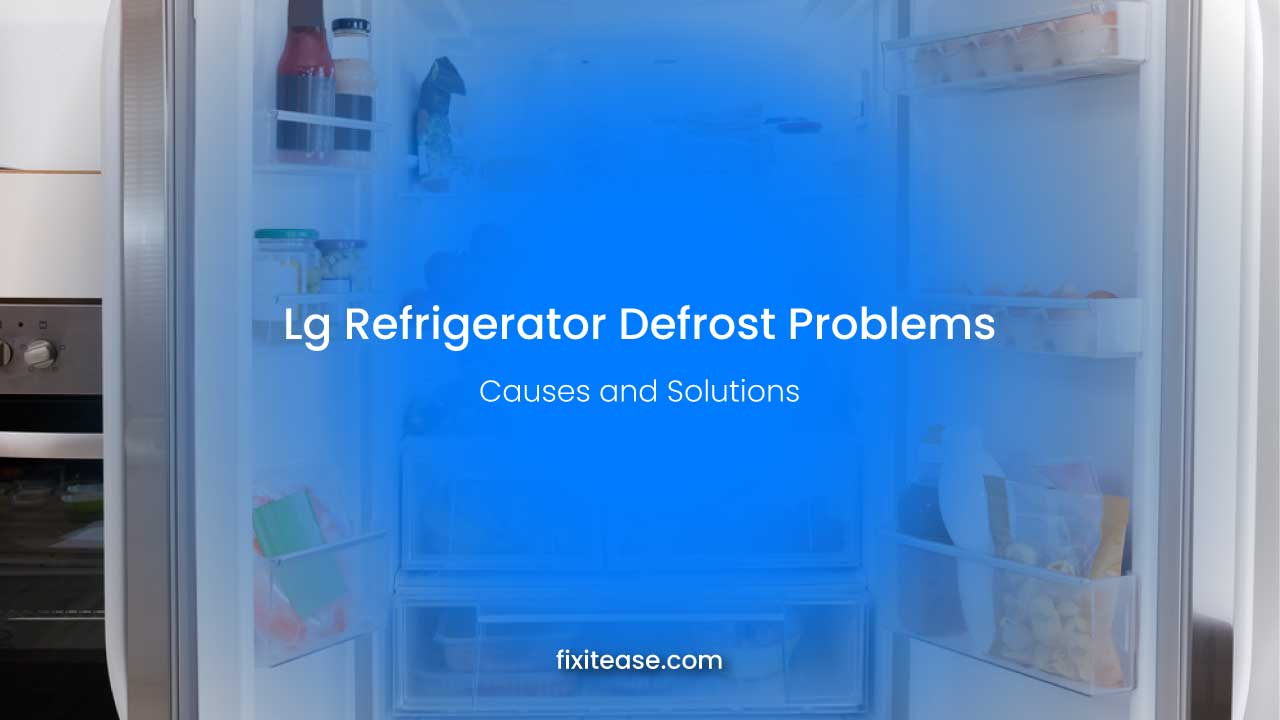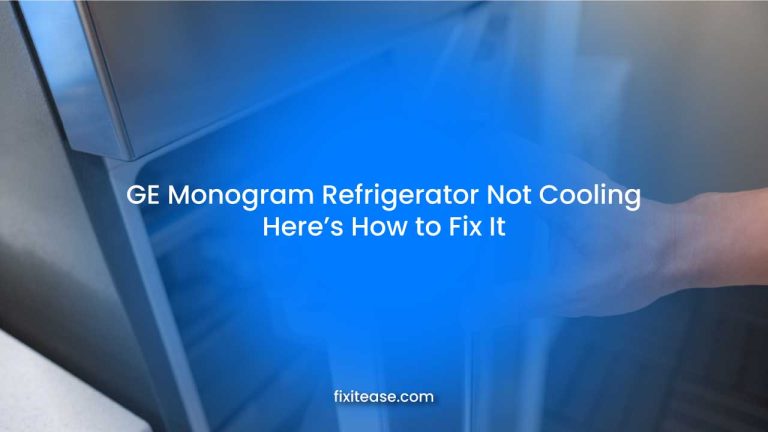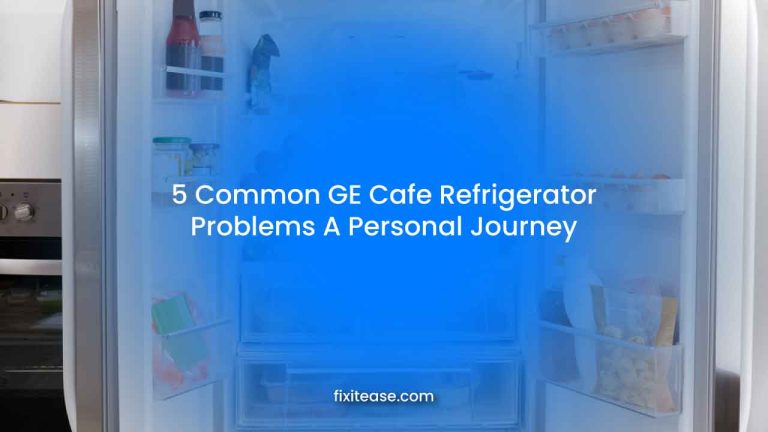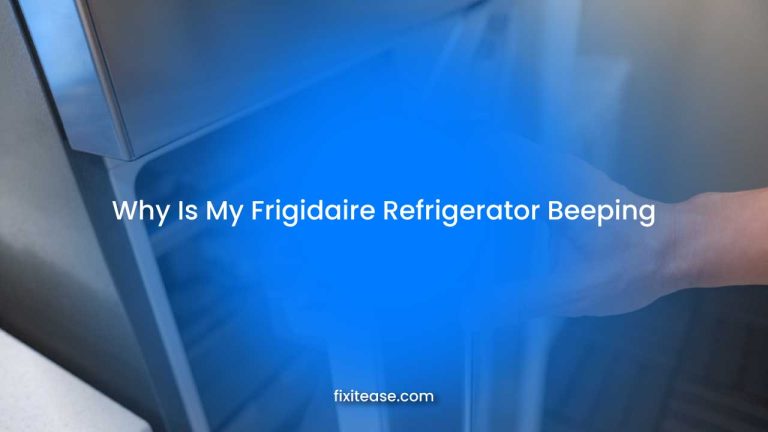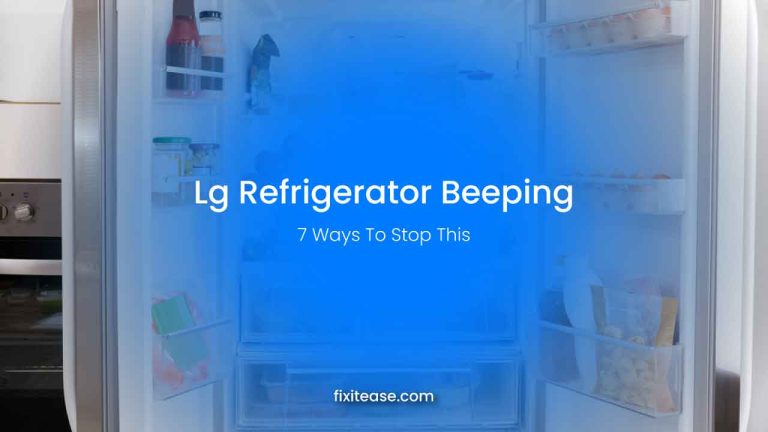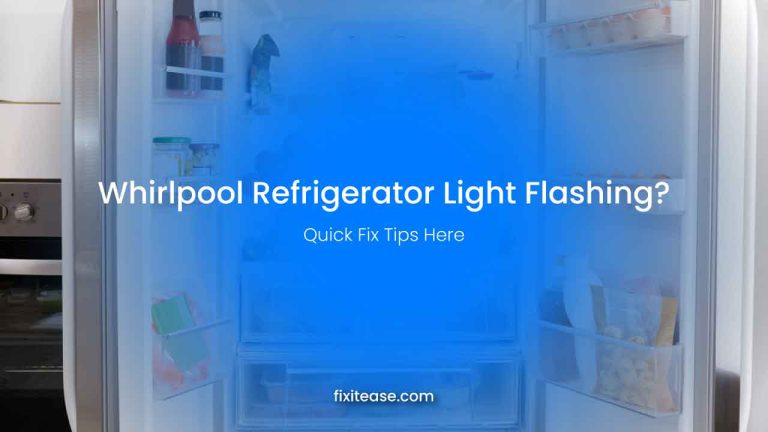LG Refrigerator Defrost Problems: Causes and Solutions
Are you tired of finding your food items partially thawed or noticing ice buildup in your LG refrigerator? If so, you’re not alone; many people face this problem. However, this can happen due to LG refrigerator defrosting problems.
If your LG refrigerator is not defrosting, it can cause a buildup of frost and ice, which can lead to several issues, including reduced cooling performance and even complete failure.
However, there are several reasons why an LG refrigerator may not be defrosting correctly. So, I explore common Lg refrigerator defrost problems and provide practical solutions to help you resolve them quickly and efficiently.
What Are The Most Common LG Refrigerator Defrost Problems?
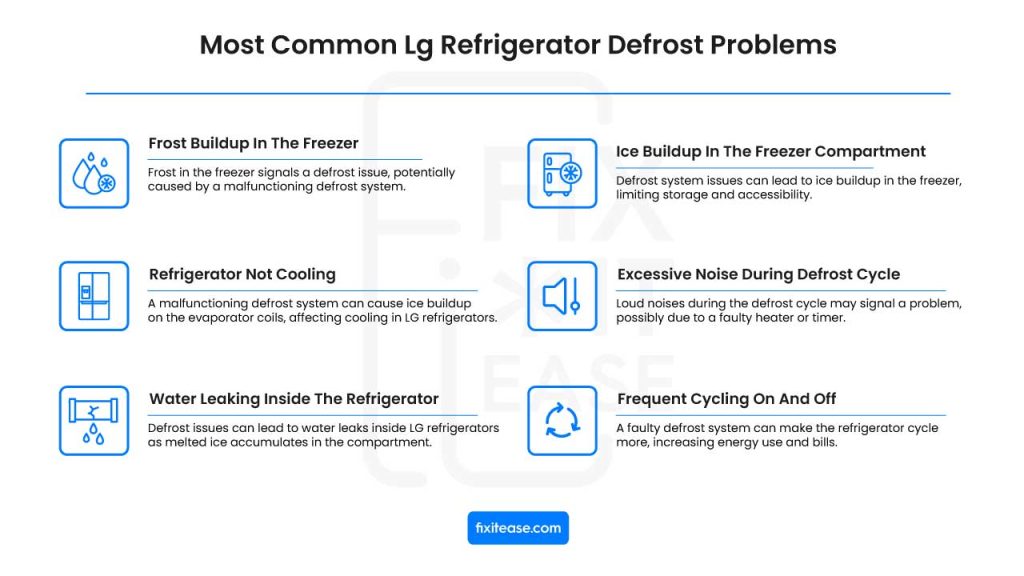
LG refrigerators are known for their reliability and innovative features. However, like any other appliance, they can experience defrost problems that can frustrate homeowners.
If you own an LG refrigerator and are facing defrost issues, it’s essential to understand its common problems.
Below are some of the most common defrost problems encountered by LG refrigerator owners:
Frost Buildup In The Freezer
One of the most noticeable signs of a defrost problem is frost buildup in the freezer compartment. However, this can happen due to a malfunctioning defrost system, which prevents the freezer from properly defrosting and results in frost accumulation.
Refrigerator Not Cooling
If your LG refrigerator is not cooling properly, it could be due to a defrost problem. When the defrost system malfunctions, ice can form on the evaporator coils, blocking the flow of cold air and preventing the refrigerator from cooling effectively.
Water Leaking Inside The Refrigerator
Another common issue associated with defrost problems is water leakage inside the refrigerator compartment. Ice can build up on the evaporator coils when the defrost system fails to function correctly. As this ice melts during the defrost cycle, it can lead to water pooling inside the refrigerator.
Ice Buildup In The Freezer Compartment
A malfunctioning defrost system can also cause ice to accumulate on the walls and shelves of the freezer compartment. However, this can restrict the storage space and make it difficult to access frozen items.
Excessive Noise During Defrost Cycle
If you notice loud or unusual noises coming from your LG refrigerator during the defrost cycle, it could indicate a defrost problem. However, this could be caused by a faulty defrost heater or a malfunctioning defrost timer.
Frequent Cycling On And Off
A malfunctioning defrost system can cause the refrigerator to cycle on and off more frequently than usual. Therefore, this can lead to increased energy consumption and higher utility bills.
If you are experiencing any of these issues with your LG refrigerator, addressing them promptly is essential to prevent further damage and inconvenience.
Common Causes and Symptoms of an LG Freezer Unexpectedly Defrosting.
Is your LG freezer defrosting unexpectedly? Such issues can be frustrating, leading to food spoilage and inconvenience. Understanding the common reasons behind an LG freezer’s unexpected defrosting can help you troubleshoot and resolve the problem more effectively.
Below, I share some of the most common causes and symptoms of this problem, allowing you to quickly identify and resolve the root cause.
| Possible Cause | Symptoms |
| Power Supply Issues or Electrical Problems | Complete shutdown of the freezer, Irregular power supply may cause sporadic defrosting |
| Faulty Temperature Sensor | Inaccurate temperature readings on the display panel, Inconsistent cooling |
| Evaporator Fan Motor Failure | Uneven cooling, No airflow or unusual noises coming from the freezer |
| Door Seal or Gasket Issues | Excessive frost buildup around the door, Difficulty in closing the door properly |
| Faulty Defrost Heater or Defrost Thermostat | Ice buildup in the freezer, Warm temperature inside the freezer, Freezer not maintaining set temperature |
| Defective Defrost Timer or Control Board | Frequent or constant defrosting, Inconsistent cooling, Temperature fluctuations |
However, it is essential to note that other issues can also cause some of these symptoms, so it is vital to diagnose the problem correctly before attempting any repairs.
How to Diagnose LG Refrigerator Defrost Problems?
To diagnose defrost problems in your LG refrigerator, start by checking for excess frost buildup on the evaporator coils. If you notice thick ice, it may indicate a faulty defrost system.
Inspect the defrost thermostat using a multimeter to measure continuity at freezer temperatures below 20 degrees Fahrenheit (-6 degrees Celsius). Similarly, examine the defrost heater for continuity. A lack of continuity in either component suggests a malfunction.
Additionally, assess the defrost timer to confirm it advances through the defrost cycle. If it remains stuck, consider replacing it. Check the defrost control board for visible signs of damage or burning.
Lastly, ensure the evaporator fan is functioning correctly, as a malfunction can hinder proper defrosting. By methodically examining these components, you can identify and address the root cause of defrost issues in your LG refrigerator.
Can I Fix My LG freezer Defrosting Problem? (Quick And Best Solution)
Having trouble with your LG refrigerator defrosting? Don’t worry, there are several quick fixes and solutions you can try to troubleshoot the issue. Whether it’s ice buildup or temperature inconsistencies, addressing the problem early can prevent further damage to your freezer.
Here are some tips to get your LG freezer back in working order:
Replacing Defrost Control Board
If your LG freezer is not defrosting, one of the first things you should check is the defrost control board. The defrost control board controls the defrost cycle in the freezer. If the defrost control board is faulty, it can cause the freezer to stop defrosting.
To replace the defrost control board, follow these steps:
- Unplug the freezer from the electrical outlet.
- Remove the screws that hold the control board cover in place.
- Disconnect the wires from the control board.
- Remove the control board from the freezer.
- Install the new control board.
- Reconnect the wires to the control board.
- Replace the control board cover and screws.
- Plug the freezer back into the electrical outlet.
Fixing Defrost Thermostat
If you’re facing issues with your LG freezer not defrosting properly, a likely culprit could be a malfunctioning defrost thermostat. This component is crucial for regulating the freezer’s temperature, and if it’s not working correctly, it can lead to defrosting problems.
To address this issue, here’s what you can do: start by unplugging the freezer from the electrical outlet for safety. Then, locate the defrost thermostat within the freezer, disconnect the wires connected to it, and remove the faulty thermostat.
Install the new defrost thermostat in its place, reconnect the wires securely, and finally, plug the freezer back into the electrical outlet. Following these steps should help resolve defrosting issues linked to a faulty defrost thermostat in your LG freezer.
Solving Evaporator Fan Motor Issues
If the evaporator fan motor is not working properly, it can cause the freezer to stop defrosting. The evaporator fan motor is responsible for circulating the cold air in the freezer. To solve evaporator fan motor issues, follow these steps:
- Unplug the freezer from the electrical outlet.
- Locate the evaporator fan motor in the freezer.
- Check if any debris blocks the fan blades.
- If the fan blades are blocked, remove the debris.
- Check the motor for continuity if the fan blades are not blocked.
- If the motor is faulty, replace it with a new one.
- Plug the freezer back into the electrical outlet.
Repairing Defrost Heater
If your LG freezer is having defrosting issues, a potential culprit might be a malfunctioning defrost heater. The defrost heater is crucial in melting the ice accumulating on the evaporator coils.
When this component is faulty, it can lead to a cessation of the defrosting process. To address this problem, follow these steps: Unplug the freezer from the electrical outlet to ensure safety. Next, locate the defrost heater within the freezer, disconnect the attached wires, and carefully remove the defective defrost heater.
Install the new defrost heater in its place, securely reconnect the wires, and finally, plug the freezer back into the electrical outlet. Following these steps, you can effectively troubleshoot and repair defrosting issues associated with a faulty defrost heater in your LG freezer.
However, If the problem persists, contacting an authorized LG service center for further assistance is recommended.
How Can I Prevent My Fridge From Having Future Defrost Problems? (Maintenance Tips)
Preventing defrost problems in an LG refrigerator ensures its longevity and optimal performance.
Here are some maintenance tips that can help:
Keep the coils clean: Dirty coils can cause dust and debris buildup, leading to poor airflow and overheating. To clean the coils, unplug the refrigerator and use a coil brush or vacuum attachment to remove dirt or dust.
Don’t overload the refrigerator: Overloading the refrigerator can cause it to work harder than it needs to, leading to overheating and defrost problems. Make sure to leave some space between items, and don’t block any of the vents.
Check the gasket: The gasket is the rubber seal around the edge of the refrigerator door. If it’s damaged or worn, it can let warm air in, causing the refrigerator to work harder than it needs to. Check the gasket regularly and replace it if necessary.
Avoid opening the door too often: When the refrigerator door is opened, warm air enters the fridge, causing it to work harder to maintain its temperature. To prevent this, open the door as little as possible and avoid leaving it open too long.
Check the airflow: Ensure proper airflow around your refrigerator. Clear any obstructions blocking the vents.
Check the defrost system: The defrost system is responsible for melting any ice buildup on the evaporator coils. If it’s not working correctly, it can cause defrost problems. Regularly check the defrost system and replace any faulty components.
Adjust the temperature settings: Ensure the freezer is set to the recommended temperature level. The ideal freezer temperature is typically between 0 to 5 degrees Fahrenheit (-18 to -15 degrees Celsius).
Frequently Asked Questions
What Should I Do If My LG Refrigerator Is Not Defrosting?
If your LG refrigerator is not defrosting, try checking the defrost timer, heater element, and the defrost thermostat. If any of these components are faulty, it can cause defrost problems. It’s recommended to contact a professional technician to diagnose and fix the issue.
How Often Should I Defrost My LG Refrigerator?
It’s recommended to defrost your LG refrigerator whenever the frost buildup reaches a quarter-inch thickness. However, some newer models have self-defrosting capabilities, so manual defrosting may not be required. Check your refrigerator’s manual for specific instructions.
Why Is My LG Refrigerator Freezing Everything?
If your LG refrigerator is freezing everything, it could be due to a faulty temperature control thermostat or a malfunctioning sensor. Additionally, blocked air vents or a malfunctioning damper control can also cause excessive cooling. It’s best to have a professional technician inspect and repair the refrigerator to resolve the issue.
Final Verdicts
To wrap up, dealing with defrost problems in your LG refrigerator can be frustrating, but understanding the root causes and implementing the appropriate solutions can save you time and money in the long run.
By regularly maintaining your refrigerator and keeping an eye on signs of defrost issues, such as icing or temperature fluctuations, you can prevent major malfunctions.
Remember to consult the user manual and seek professional help if needed. With proper care and attention, you can ensure the efficient performance and longevity of your LG refrigerator.

